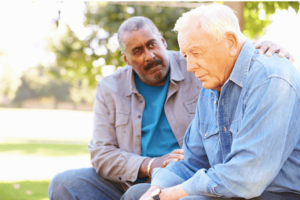This blog will share 5 ways to cope when a loved one passes away. If you are here as a result of losing a loved one, we share with you our condolences as you navigate this. We never truly know how much time we have left with our loved ones, and it can be a shock to our system whether death occurs suddenly or gradually.
Whether they are battling a mental illness or an addiction, die by suicide, or are victim’s of circumstance, it is common to feel regretful that we never expressed our love for them enough, or we may carry feelings of guilt, shame, or anger.
It can be easy to fall into negative thought patterns about the loss of someone close. You may blame yourself for not doing enough, or “not being there for them enough,” whether physically by their side, or checking in with them regularly. It could also be that you feel that others are to blame for this loss.
There are 5 typically recognized stages of grief that one may experience during a grieving process. They don’t always occur in the same order, and you may experience them differently than anyone else. Grief is a personal experience, and a difficult one to go through alone. The 5 stages include:
- Denial. This can be described as a state of shock, that we don’t truly believe our loved one is no longer with us. We may reject the idea that they’ve passed, and try to convince ourselves otherwise.
- Anger. This can show up in different ways, but you may feel frustrated, easily irritable, and feeling mad at the world around you. You may blame others, or you may blame yourself.
- Bargaining. You may feel a loss of control at this time, and want to work to get it back. You may begin thinking “what if I did this”, or “if only I did that”. Individuals that are religious or more faith-based may ask their God or higher power to make a deal or make a promise to them if they bring their loved one back.
- Depression. This can show up in feeling numb or frequently sad. Time passes you by, and you remain curled up in bed, not having moved all day. You may feel a loss of interest in attending to relationships, activities, schoolwork, or work. Feelings of sadness and hopelessness can arise. It is important to note that symptoms or signs of bereavement or grief may mimic symptoms of clinical depression, but are not the same.
- Acceptance. Acceptance does not necessarily mean you are feeling okay with what happened, or looking at what happened in a positive way. It may only mean that you can more readily accept the loss, and how that is changing the course of your life.
Grief counseling in Simi Valley, CA helps you address and work through grief in a way that feels supportive, grounded, and accepting. Make sure to read our blog on What is Grief Counseling to understand what you can expect.
Grief is non-linear. We often vacillate between the stages rather than moving through them in a perfect, straight line. We might work through a grieving period and then re-experience feelings of grief at a later time when reminded or triggered of the event or experience.
5 Ways to Cope When a Loved One Passes Away: Spend time with family or friends

You may notice yourself isolating or spending time alone. While it is healthy to attend to yourself and take time to be alone, there are instances where self-isolation can be unhealthy. While ensuring that you have time to mourn personally, mourning with a community such as friends or family can be helpful.
It may feel difficult to pick up the phone. You just want to lay in bed, not get up to shower or eat, and remain in solitude. This is often a typical part of the grieving process for many. You simply don’t want to talk to or see anyone, and just want to mourn by yourself. Especially if this was someone you had very close relations to, compared to your family or friends.
Try to stay in touch with family or friends during this time.
Remain communicative about your feelings and needs. You may find yourself wanting external support, for friends or family to be by your side; although, you may not want them to try to converse about the person you have lost, and just sit with you in silence or offer distraction.
Sometimes, just having someone in your presence while you cry, and to listen to what you have to say, can be extremely healing. You will know you’re not alone throughout this, and have people there for you. You can take up space and share memories, experiences, or difficult feelings.
Grief therapy in Simi Valley, CA holds space for the growth and self-understanding that often comes from processing grief. You may discover certain need
Knowing that relationships are the vehicle we use to heal, we may provide additional referrals to community resources, such as grief groups specific to your experiences.
5 Ways to Cope When a Loved One Passes Away: Accept and allow yourself to experience difficult emotions

Accepting and allowing yourself to experience difficult emotions is not easy. It’s also not reasonable that someone can instantly accept the loss and be able to process it. As mentioned above, you may find yourself fluctuating between the stages of grief.
These 5 stages do not always occur in order. You may float between stages, feeling some stronger than others. It’s possible to experience these stages numerous times, and at the same time. You may feel depressed, angry, and struggling to accept what has happened, all within the same breath.
Try to envision that you are looking at yourself from the outside. You see yourself in pain, anguish, and deep sorrow – it’s important not to reject these difficult emotions inside of you.
You can experience these, while gently guiding yourself and taking care of yourself – this often includes self-compassion and accepting your own pace with grief.
Avoid denying true emotions to others, writing yourself off as “feeling fine” when in reality, you are not. While you don’t have to go into detail with everyone about your loss, be honest and open with yourself. “No, I’m not doing okay. But I will get through this”.
Grief counseling in Simi Valley, CA supports you in acknowledging and accepting difficult emotions. From there, you are provided with coping mechanisms and skill sets to manage them in a healthy way. Consider reading our blog on Online Therapy vs In Office Therapy to see what format works best for your needs.
It’s common that individuals will try to rid uncomfortable feelings by using substances, such as drugs or alcohol. Please know that this only temporarily takes away the pain, but it will still linger inside of you.
5 Ways to Cope When a Loved One Passes Away: Create something in their honor with memorable items or photos

Creating something special is a great way to honor your loved one for who they were and what they meant to you. You may have fond memories with them. Whether this be through photos, through memorabilia, and more. Using tangible objects or rituals that remind you of your loved one can be healing and comforting.
One example is making a photobook dedicated to them. You may ask their friends or family members for pictures to add to this book. Adding in excerpts, such as messages to your loved one, or quotes they often said, can add greater meaning to the experience.
Each culture has its own mix of norms, beliefs, traditions, behaviors, and rituals for when someone passes away.
There may be group gatherings and mournings, or it can be more personal and independent. Nonetheless, there is no correct way to grieve and this process may be heavily influenced by the individual and their culture.
For instance, in Mexican culture, El Día de los Muertos is a holiday where souls of the deceased are welcomed back to the Earth’s plane through offerings such as food, drinks, candles, and more through community prayer and celebration.
In certain Pacific Islander culture, there are multi-day events dedicated to family gatherings and feasting in their loved ones honor. There may be singing, musical and dance tributes, or scripture and poetry readings. This is all dedicated to remembering and honoring their loved one.
You might consider how this individual impacted your life and how you can incorporate their values and beliefs into your life moving forward. For instance, they may have inspired you to pursue a career in helping others, or you might feel inclined to volunteer at charities they supported. Knowing how they shaped your life in some way, and incorporating that into your future is an avenue to keep your loved one with you.
Grief counseling in Simi Valley, CA can help you identify ways you can best honor your loved one that fits with who you are. You will be supported during this process and can collaborate with your therapist to express your love for them when words may not suffice.
Having perspectives that your loved ones are still with you, and are watching over you, can bring a sense of peace within you. Being able to pay tribute to them in special ways can highlight how grateful you are to have had them in your life.
5 Ways to Cope When a Loved One Passes Away: Take care of yourself physically and mentally

Taking care of yourself may not be the first priority that comes to mind for you. It may not feel realistic as well. You may be responsible for notifying others of a loved one’s passing, planning a funeral or memorial service, or trying to be there for others.
However, taking care of yourself physically and mentally is a crucial step in coping when a loved one passes away. Being mindful of how we speak to ourselves, as well as others, plays a major part in our healing journey.
You can take care of yourself physically in a number of ways:
- Get your body moving. Whether this is taking a walk around the block, engaging in exercise, or doing some simple stretching. Try to do this at least once a day.
- Stay hydrated. Continue to drink plenty of water during this time to avoid dehydration. Avoid only drinking soda or alcoholic beverages.
- Feed yourself. You may have a complete loss of appetite during this time, and feel unmotivated to cook yourself anything, or pick up food. Try to eat throughout the day to give yourself energy. You might consider asking others to help you with grocery shopping or cooking.
You can take care of yourself mentally in a number of ways:
- Be kind to yourself during this time. Challenge negative self-talk and try to guide yourself with love, understanding, and care. It may not be easy, but make those attempts through meditations, mantras, reading, and more.
- Engage in soothing activities. This can look like watching your favorite show or movie, listening or playing music that matches your mood, or another activity like baking or crafting. Soothing activities can also be a form of exercise, as a way to relieve stress.
- Acknowledge and accept what you are currently needing. Trust yourself and what your needs are. Are you needing to be alone for the day, or are you needing additional support from friends or family?
Individual therapy in Simi Valley, CA provides you with a space to identify your current needs. It could be that you feel a total loss of interest in doing anything. It may feel selfish to prioritize your needs. Grief therapists can help you get to a place of honoring the need to attend to yourself.
It’s possible that you may not feel you can identify ways to take care of yourself during this time. However, it’s important to do so, to ensure you provide yourself with energy to continue on.
5 Ways to Cope When a Loved One Passes Away: Seek out mental health support

Seeking out mental health support can greatly help when a loved one passes away. As you go through the stages of grief, it can be distressing or disorienting. It can impact your regular functioning on a daily basis. This includes personal self-care, issues with sleep, issues with work or school, or issues within relationships.
There are various types of mental health support available for grief. Local support groups are often held at funeral homes or can be located through the county. Mental health professionals may also be able to provide referrals to support groups near you or that are virtual.
Group therapy sessions for grief is also a resource. Depending on your location and what facilities in your area offer, there may be some running on a weekly basis. Check in with local therapy groups to inquire about any ongoing groups, or if they can point you in the direction of one.
Individual counseling or family counseling is also an option for grieving. Whether you are seeking to process the grief alone, or involve family members who are also grieving, there are grief counselors available to support you. Depending on your unique needs, one option of therapy may be better than the other.
If you live in the Ventura County or Los Angeles County area and believe you or a loved one is experiencing grief, please contact us to learn more about the ways we can provide support.
If you are interested in getting started in grief counseling in Simi Valley, read our blog on Therapy: Where to Start, where we share four essential tips that make the process seamless and easy for you. We also share tips to help you decide whether Online Therapy or In Office Therapy would be best for your needs.
Consider calling our therapy group at (805) 774-1506 for a free consultation!
Seek out a validating, safe environment with us today. We will help you get to where you want to be. Our therapists provide teen therapy, individual adult therapy, LGBTQIA+ therapy, anxiety therapy, depression therapy, family therapy, and more in-office in Simi Valley, CA.
 Monday – Friday: 9:00 am to 6:00 pm
Monday – Friday: 9:00 am to 6:00 pm 2489 Tapo St. Suite B
2489 Tapo St. Suite B  805-774-1506
805-774-1506